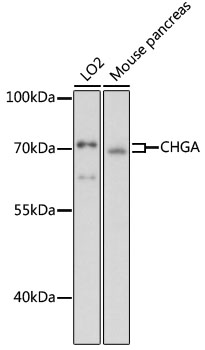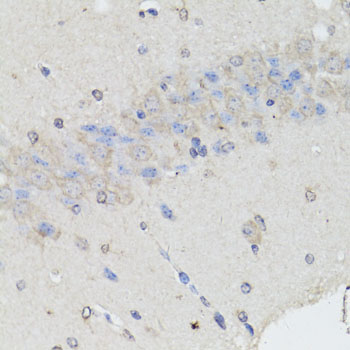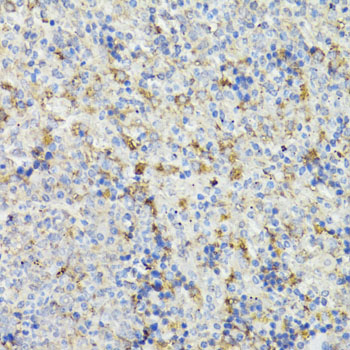-
Product Name
CHGA Polyclonal Antibody
- Documents
-
Description
Polyclonal antibody to CHGA
-
Tested applications
WB, IHC
-
Species reactivity
Human, Mouse, Rat
-
Alternative names
CHGA antibody; CGA antibody; chromogranin-A antibody
-
Isotype
Rabbit IgG
-
Preparation
Antigen: Recombinant fusion protein containing a sequence corresponding to amino acids 230-380 of human CHGA (NP_001266.1).
-
Clonality
Polyclonal
-
Formulation
PBS with 0.02% sodium azide, 50% glycerol, pH7.3.
-
Storage instructions
Store at -20℃. Avoid freeze / thaw cycles.
-
Applications
WB 1:500 - 1:2000
IHC 1:50 - 1:200 -
Validations

Western blot - CHGA Polyclonal Antibody
Western blot analysis of extracts of various cell lines, using CHGA antibody at 1:1000 dilution.Secondary antibody: HRP Goat Anti-Rabbit IgG (H+L) at 1:10000 dilution.Lysates/proteins: 25ug per lane.Blocking buffer: 3% nonfat dry milk in TBST.Detection: ECL Basic Kit .Exposure time: 90s.

Immunohistochemistry - CHGA Polyclonal Antibody
Immunohistochemistry of paraffin-embedded mouse brain using CHGA antibody at dilution of 1:150 (40x lens).

Immunohistochemistry - CHGA Polyclonal Antibody
Immunohistochemistry of paraffin-embedded mouse spleen using CHGA antibody at dilution of 1:150 (40x lens).
-
Background
Pancreastatin: Strongly inhibits glucose induced insulin release from the pancreas.; Catestatin: Inhibits catecholamine release from chromaffin cells and noradrenergic neurons by acting as a non-competitive nicotinic cholinergic antagonist. Displays antibacterial activity against Gram-positive bacteria S.aureus and M.luteus, and Gram-negative bacteria E.coli and P.aeruginosa. Can induce mast cell migration, degranulation and production of cytokines and chemokines. Acts as a potent scavenger of free radicals in vitro. May play a role in the regulation of cardiac function and blood pressure.; Serpinin: Regulates granule biogenesis in endocrine cells by up-regulating the transcription of protease nexin 1 (SERPINE2) via a cAMP-PKA-SP1 pathway. This leads to inhibition of granule protein degradation in the Golgi complex which in turn promotes granule formation.
Related Products / Services
Please note: All products are "FOR RESEARCH USE ONLY AND ARE NOT INTENDED FOR DIAGNOSTIC OR THERAPEUTIC USE"
